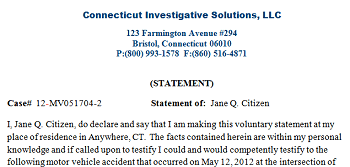Interviews and Statements
Interviews and statements are essential tools in the investigative process, serving as a primary means of gathering relevant information and evidence. They are conducted for a wide range of reasons and play a critical role in uncovering the facts surrounding an incident or allegation. Whether the situation involves a crime, a motor vehicle accident, or a civil dispute, obtaining reliable and detailed information through interviews can significantly affect the course of the investigation and the outcome in court.
Properly conducted interviews help investigators clarify events, timelines, and the actions of those involved. They also provide valuable insights into the behavior and credibility of witnesses, claimants, suspects, or involved parties. This information can assist in identifying liable individuals, verifying claims, and ruling out false or misleading accounts.
Statements and interviews are particularly useful in cases involving:
- Insurance claims (e.g., property damage, theft, or personal injury)
- Personal injury lawsuits (e.g., slip and fall accidents or workplace injuries)
- Motor vehicle accidents (e.g., collisions causing injury or damage)
- Employee investigations (e.g., harassment, misconduct, or policy violations)
- Trademark infringement and other intellectual property disputes
- Other litigated matters requiring formal documentation and factual clarity
In legal contexts, a well-documented statement can support or refute allegations and may be admissible in court as evidence. Attorneys often rely on these statements to build arguments, challenge opposing claims, and negotiate settlements. Similarly, insurance adjusters use them to determine the validity of a claim and whether coverage applies.
Ultimately, interviews and statements are not just procedural formalities—they are vital components of any thorough investigation. When obtained and handled correctly, they can uncover the truth, protect the rights of all parties involved, and contribute to a just resolution.
